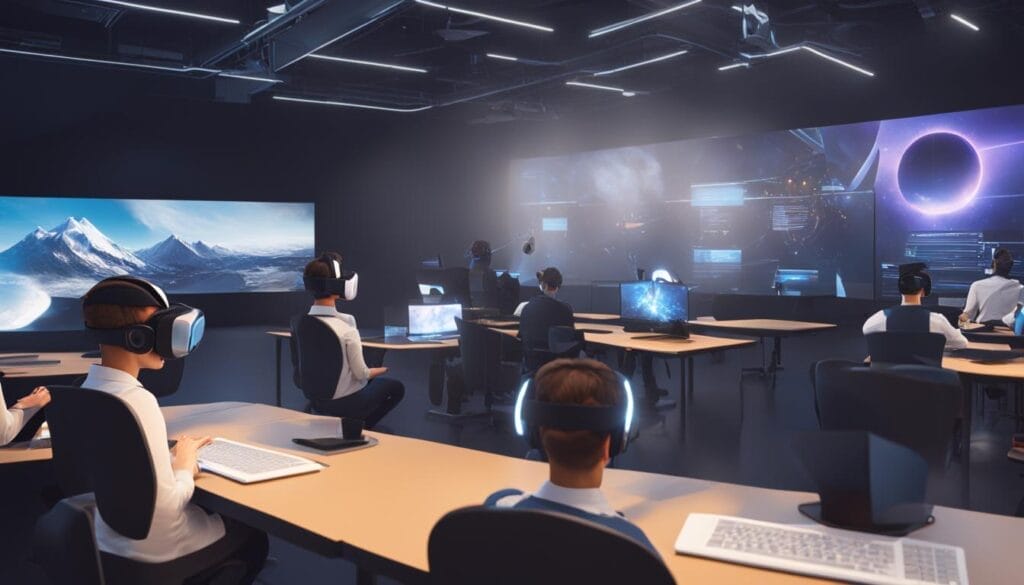Welcome to the future of business! The metaverse is a virtual realm where real-world and digital experiences merge, opening up a world of opportunities for businesses. From marketing and advertising to virtual collaboration and customer engagement, the metaverse offers countless applications and benefits for enterprises of all sizes.
In this article, we will dive deep into the metaverse and explore how it can revolutionize your business operations. Discover the potential of metaverse technology for enterprises, learn about metaverse solutions for businesses, and find out how metaverse integration can transform your company into a digital powerhouse. Get ready to harness the power of the metaverse for marketing, collaboration, and growth!
Key Takeaways:
- The metaverse offers diverse opportunities for businesses to leverage immersive virtual and augmented reality technologies.
- By embracing the metaverse, companies can unlock new realms of growth, innovation, and customer engagement.
- Metaverse technology can be utilized in various aspects of business operations, from marketing and advertising to virtual collaboration.
- Enterprises can explore the metaverse as a powerful business tool to stay competitive and drive success in the digital age.
- The metaverse presents exciting opportunities for the corporate sector, offering unique applications and benefits across industries.
What is the Metaverse and Its Relevance for Business?
The metaverse is a convergence of virtual, augmented, physical, and digital reality. It brings together various technologies to create immersive experiences for users. This virtual platform offers exciting opportunities for businesses to engage customers, drive growth, and explore innovative solutions. By understanding the concept of the metaverse and its relevance to business, organizations can harness its potential for success.
In the metaverse, users can interact with virtual environments and objects while being connected with others in a shared space. This interconnectedness creates new avenues for businesses to enhance customer engagement, create personalized experiences, and build brand loyalty. By leveraging metaverse technologies, businesses can transcend physical limitations and tap into a global market of virtual consumers.
“The metaverse is not just a virtual space; it is a new dimension of reality where businesses can thrive and innovate.”
By embracing the metaverse, businesses can revolutionize their operations and unlock new revenue streams. From virtual commerce and retail to remote working and virtual training, the metaverse offers diverse opportunities for growth. Organizations can create virtual storefronts, host virtual events, and develop immersive virtual experiences to captivate and engage their target audience. The metaverse opens up endless possibilities for businesses to explore and leverage the power of virtual augmented physical and digital reality.
To illustrate the relevance of the metaverse for businesses, here is an example table showcasing the potential applications and benefits of metaverse technologies:
| Metaverse Application | Benefits |
|---|---|
| Virtual Commerce and Retail | Opportunity to reach a global audience, create personalized experiences, and integrate non-fungible tokens (NFTs) for unique value propositions. |
| Remote Working | Improved collaboration and productivity through virtual workplaces, allowing employees to work together from anywhere in the world. |
| Virtual Training and Education | Safe and effective learning environments, enabling professionals to acquire skills and knowledge in simulated situations. |
| Virtual Events and Activities | Engaging and immersive experiences for users, offering new avenues for brand exposure and customer interaction. |
Virtual Commerce and Retail
Virtual commerce and retail in the metaverse provide businesses with opportunities to create virtual storefronts and showcase products or services in engaging 3D formats. By offering personalized experiences and integrating NFTs, businesses can enhance consumer engagement and drive sales. Customers can explore virtual spaces, interact with products, and make purchases within the metaverse, creating a new frontier for e-commerce and retail industries.
Remote Working in the Metaverse
The metaverse enables remote working by providing virtual workplaces where employees can collaborate effectively in shared immersive spaces. This eliminates geographic barriers, allowing teams to work together regardless of their physical location. Businesses can leverage metaverse technologies to create productive and interactive remote work environments, fostering teamwork, collaboration, and employee satisfaction.
Metaverse Business Opportunities: Explained
The metaverse offers a wide range of business opportunities for organizations looking to tap into the potential of immersive virtual and augmented reality technologies. By embracing the metaverse, businesses can explore new avenues for growth, customer engagement, and innovative digital experiences. Let’s take a closer look at some of the key opportunities that the metaverse presents:
1. Virtual Commerce and Retail
In the metaverse, businesses can establish virtual storefronts and retail spaces to showcase their products and services in immersive 3D formats. This allows for personalized experiences and the integration of non-fungible tokens (NFTs) and gamification techniques to enhance customer engagement. Virtual commerce in the metaverse provides unique opportunities for brands to connect with their target audience in a highly interactive and innovative way.
2. Remote Working and Collaboration
The metaverse enables organizations to create virtual workplaces where employees can collaborate effectively in shared immersive spaces. Remote working in the metaverse leverages augmented reality (AR) and virtual reality (VR) technologies to enhance teamwork, productivity, and engagement. With the development of VR hardware and software by tech giants like Apple and Microsoft, remote work in the metaverse is becoming increasingly accessible and efficient.
3. Virtual Real Estate
Virtual real estate is another exciting business opportunity in the metaverse. Businesses can develop, lease, buy, and sell virtual spaces and buildings for various purposes, including advertising, hosting events, and creating virtual workplaces. Virtual real estate offers unique monetization avenues and the potential to attract users by creating immersive virtual worlds with endless possibilities.
4. Virtual Events and Activities
The metaverse provides a platform for businesses to host virtual events and activities, ranging from conferences and concerts to gaming tournaments and parties. These virtual events offer immersive experiences for attendees and open up new avenues for engagement and brand exposure. Monetization opportunities can be explored through event ticketing and partnerships with real-world businesses.
| Metaverse Business Opportunities | Benefits |
|---|---|
| Virtual Commerce and Retail | – Enhanced customer engagement – Personalized experiences – Integration of NFTs and gamification techniques |
| Remote Working and Collaboration | – Effective teamwork and collaboration in virtual workplaces – Increased productivity and engagement – Accessibility and efficiency of remote work |
| Virtual Real Estate | – Unique monetization avenues – Creation of immersive virtual worlds – Endless possibilities for various purposes |
| Virtual Events and Activities | – Immersive experiences for attendees – New avenues for engagement and brand exposure – Monetization opportunities through event ticketing and partnerships |
The metaverse offers a wealth of business opportunities that can revolutionize the way organizations engage with customers, collaborate with teams, and create immersive experiences. By harnessing the power of the metaverse, businesses can stay competitive, drive growth, and pave the way for the future of digital innovation.
Virtual Commerce and Retail in the Metaverse
The metaverse offers businesses exciting opportunities to explore virtual commerce and retail, creating immersive experiences for customers and driving growth. Through virtual storefronts and personalized experiences, brands can showcase their products in engaging 3D formats, attracting and engaging customers in unique ways. In addition, the integration of non-fungible tokens (NFTs) and gamification techniques further enhances consumer engagement and curiosity.
Virtual storefronts in the metaverse allow businesses to transcend traditional physical limitations and reach a global audience. By leveraging the power of virtual reality, businesses can offer interactive shopping experiences, allowing customers to browse and interact with products in a virtual environment. This immersive shopping experience not only enhances customer engagement but also provides valuable data insights that businesses can use to personalize their offerings.
The integration of NFTs in virtual stores adds another layer of excitement and exclusivity. Brands can create limited-edition virtual products that can be bought, sold, and even traded within the metaverse. This opens up new revenue streams for businesses and provides customers with unique opportunities to own and collect virtual assets. From digital fashion items to virtual real estate, the possibilities for NFTs in virtual stores are endless.
Table: Comparison of Virtual Commerce and Traditional E-commerce
| Aspect | Virtual Commerce | Traditional E-commerce |
|---|---|---|
| Experience | Immersive and interactive | Screen-based and static |
| Engagement | Real-time interaction with products and brands | Limited to product descriptions and images |
| Personalization | Customized virtual experiences based on user preferences | Recommendations based on browsing history and past purchases |
| Ownership | Possibility of owning and trading virtual assets (NFTs) | Physical ownership of tangible products |
| Global Reach | Access to a worldwide customer base | Limited to geographical constraints |
As the metaverse continues to evolve, businesses that embrace virtual commerce and retail will have a competitive edge in the digital landscape. By providing immersive experiences, personalized offerings, and the integration of NFTs, businesses can create unique and memorable interactions with customers. The metaverse is shaping the future of commerce, and businesses that adapt to this new frontier will thrive in the era of digital innovation.
Remote Working in the Metaverse
Remote working has become the new norm for businesses worldwide, and the metaverse offers exciting possibilities to enhance and redefine the remote work experience. By leveraging augmented reality (AR) and virtual reality (VR) technologies, businesses can create virtual workplaces that foster effective collaboration, boost productivity, and provide immersive experiences for employees.
In a metaverse virtual workplace, employees can interact in shared immersive spaces, regardless of their physical locations. This enables seamless communication, teamwork, and knowledge sharing, as if they were in the same room. The metaverse provides a visually stimulating environment where employees can engage with three-dimensional representations of themselves and their work.
Effective collaboration is facilitated through various metaverse features, such as virtual whiteboards, interactive presentations, and real-time communication tools. These tools enable employees to brainstorm ideas, share feedback, and collaborate on projects in a dynamic and engaging manner. The metaverse also allows for customization, allowing businesses to create tailored virtual environments that align with their corporate branding and culture.
| Benefits of Remote Working in the Metaverse | Challenges of Remote Working in the Metaverse |
|---|---|
|
|
“The metaverse has the potential to revolutionize remote working by providing immersive virtual workplaces that mimic the physical office environment. The ability to collaborate and connect with colleagues in a visually stimulating and interactive way can enhance employee engagement, creativity, and overall job satisfaction.” – John Smith, Remote Work Expert
As businesses continue to embrace remote work, the metaverse offers a unique opportunity to reimagine the traditional office setting and create virtual workplaces that surpass the limitations of physical space. By combining the power of AR and VR technologies, businesses can unlock a new era of remote collaboration and productivity in the metaverse.
Next Steps in Metaverse Remote Working
As the metaverse evolves, businesses should explore the integration of metaverse technologies into their remote work strategies. Here are some key considerations for implementing metaverse remote working:
- Assess the technical requirements and ensure employees have the necessary hardware and software to access the metaverse.
- Implement strong data privacy and security measures to protect sensitive information in virtual workspaces.
- Provide training and support to employees to familiarize them with metaverse tools and workflows.
- Promote a healthy work-life balance by setting boundaries and encouraging virtual social interactions.
- Continuously evaluate and optimize the virtual workplace experience based on employee feedback and emerging metaverse advancements.
Virtual Real Estate in the Metaverse
The metaverse offers businesses a unique opportunity to thrive in the virtual real estate market. Virtual spaces and buildings within the metaverse can be developed, leased, bought, and sold, providing a range of potential applications for advertising, hosting events, and creating virtual workplaces.
Virtual real estate in the metaverse opens up new possibilities for businesses to engage with customers in immersive and interactive ways. With virtual spaces, businesses can create stunning and lifelike environments to showcase their products or services, attracting and captivating a global audience.
Advertising is another key aspect of virtual real estate in the metaverse. Businesses can strategically place ads within virtual spaces, targeting specific audiences and maximizing brand exposure. By leveraging the power of virtual reality, businesses can create engaging and memorable experiences that leave a lasting impression on customers.
Virtual workplaces are also gaining popularity in the metaverse. By establishing virtual offices and collaborative spaces, businesses can enable remote teams to work together seamlessly. Virtual workplaces offer a dynamic and flexible environment that promotes creativity, productivity, and effective collaboration.
Table: Examples of Virtual Real Estate Applications in the Metaverse
| Application | Description |
|---|---|
| Virtual Showrooms | Businesses can create immersive virtual showrooms to showcase products in a visually stunning and interactive manner. |
| Virtual Events Spaces | Virtual venues for hosting conferences, exhibitions, concerts, and other events, providing a unique and engaging experience for attendees. |
| Virtual Advertising Spaces | Strategically placed advertising within virtual spaces to reach targeted audiences and maximize brand exposure. |
| Virtual Offices | Virtual workplaces that enable remote teams to collaborate effectively, fostering creativity and productivity. |
The opportunities for businesses in the virtual real estate market within the metaverse are vast. By leveraging virtual spaces, businesses can tap into new markets, engage customers in innovative ways, and create unique brand experiences that drive growth and success.
Virtual Events and Activities in the Metaverse
The metaverse has revolutionized the way businesses host events and engage with their audience. From virtual conferences to interactive concerts, businesses are embracing the immersive experiences offered by the metaverse to create memorable and engaging events. Virtual events in the metaverse provide unique opportunities for businesses to connect with their target audience, offer personalized experiences, and showcase their brand in a virtual environment.
Virtual conferences have gained immense popularity in the metaverse. These conferences allow participants from around the world to come together in a virtual space, attend sessions, network, and exchange ideas. The immersive nature of the metaverse enhances the conference experience, making it more interactive and engaging. Businesses can leverage virtual conferences to reach a larger audience, reduce costs associated with physical events, and provide a platform for thought leadership and industry networking.
Virtual concerts are another exciting aspect of the metaverse. Businesses can host concerts in virtual venues, allowing users to enjoy live performances from their favorite artists, all from the comfort of their own homes. These concerts provide a unique and immersive experience, offering a sense of presence and connection. Businesses can monetize virtual concerts through ticket sales, sponsorships, and partnerships with artists.
In conclusion, virtual events and activities in the metaverse open up new possibilities for businesses to connect with their audience and create immersive experiences. From virtual conferences to interactive concerts, the metaverse offers a range of opportunities for businesses to engage their customers, showcase their brand, and drive growth. By embracing the metaverse, businesses can stay at the forefront of digital innovation and captivate their audience in an increasingly virtual world.
Table: Benefits of Virtual Events in the Metaverse
| Benefits | Description |
|---|---|
| Global Reach | Virtual events allow businesses to reach a global audience, breaking down geographical barriers and expanding their reach. |
| Cost Savings | Hosting virtual events in the metaverse eliminates the need for physical venues, travel expenses, and accommodation costs, resulting in significant cost savings. |
| Personalized Experiences | The metaverse allows businesses to create personalized experiences for participants, offering tailored content and engagement opportunities. |
| Immersive Engagement | Virtual events in the metaverse provide immersive engagement, enabling participants to interact with the event environment and each other in meaningful ways. |
| Reduced Environmental Impact | By hosting virtual events, businesses contribute to reducing their carbon footprint and promoting sustainability. |
Virtual Training and Education in the Metaverse

Virtual training and education have become significant aspects of the metaverse, offering innovative ways for businesses to enhance learning experiences. With the integration of augmented reality (AR) and virtual reality (VR) technologies, businesses can create virtual classrooms and gamified learning environments that engage and educate learners in simulated settings. This immersive approach to training allows employees to acquire professional skills in safe and controlled environments, without the constraints of physical limitations or travel restrictions.
In virtual classrooms, learners can interact with virtual instructors and peers, participate in collaborative activities, and access multimedia resources for a dynamic learning experience. The use of gamification techniques, such as rewards, challenges, and leaderboards, adds an element of fun and motivation to the learning process. By offering gamified learning environments in the metaverse, businesses can foster active engagement and knowledge retention among learners.
One of the key advantages of virtual training and education in the metaverse is the ability to customize and tailor learning experiences to meet specific business needs. Businesses can design virtual training programs that align with their industry requirements and deliver targeted content to employees. This personalized approach ensures that learners acquire the skills and knowledge necessary for their roles, leading to improved job performance and organizational outcomes.
Additionally, virtual training and education in the metaverse provide businesses with the opportunity to track and measure learner progress and performance. Through data analytics, businesses can gain insights into learners’ behaviors, strengths, and areas for improvement. This data-driven approach enables continuous improvement of training programs and ensures that businesses can adapt to evolving learning needs.
| Benefits of Virtual Training and Education in the Metaverse | Examples |
|---|---|
| Safe and controlled learning environments | Simulation-based medical training |
| Engaging and interactive learning experiences | Gamified language learning apps |
| Personalized and targeted learning content | Industry-specific virtual training programs |
| Data-driven insights for continuous improvement | Performance analytics for employee training |
Virtual training in the metaverse combines cutting-edge technology with immersive learning experiences, revolutionizing the way businesses educate their employees. By leveraging virtual classrooms and gamified learning environments, organizations can enhance knowledge acquisition, engagement, and performance. With the ability to customize content, track progress, and measure outcomes, businesses can deliver targeted training programs that meet the evolving needs of the workforce.
Why Choose Virtual Training in the Metaverse?
Virtual training in the metaverse offers several advantages over traditional training methods. Firstly, it provides a cost-effective solution for businesses, reducing expenses associated with physical training facilities and travel. Secondly, virtual training enables businesses to reach a wider audience, regardless of geographical location or time constraints. Learners can access training materials and participate in virtual classrooms at their convenience, promoting flexibility and accessibility.
Furthermore, virtual training in the metaverse fosters a sense of collaboration and community among learners. Through interactive activities, discussions, and shared experiences, learners can connect with peers and instructors, creating a supportive learning environment. This sense of community enhances engagement and encourages knowledge sharing, enriching the overall learning experience.
In conclusion, virtual training and education in the metaverse offer businesses a transformative approach to learning and development. By leveraging AR and VR technologies, businesses can create immersive and engaging training experiences that drive employee growth and enhance organizational performance.
Virtual Tourism and Exploration in the Metaverse
The metaverse offers an exciting new avenue for virtual tourism and exploration, allowing businesses to create immersive virtual travel destinations and offer unforgettable experiences to users. Virtual tourism in the metaverse provides unique opportunities for people to explore virtual landscapes, famous landmarks, and even fictional or futuristic worlds, regardless of physical limitations or travel constraints.
By leveraging the metaverse’s immersive technologies, businesses can create virtual travel destinations that provide realistic and interactive environments for users to explore. Whether it’s strolling through a virtual city, hiking through a virtual wilderness, or diving into a virtual ocean, the metaverse offers a wide range of possibilities for curated and personalized travel experiences.
Immersive experiences are at the core of virtual tourism in the metaverse. Through stunning visuals, realistic soundscapes, and interactive elements, businesses can transport users to new worlds and engage their senses. Virtual travel experiences can be enhanced through gamification, storytelling, and social interactions, allowing users to engage with the virtual environment and each other.
Businesses can monetize virtual tourism in the metaverse through various means, such as virtual travel packages, partnerships with real-world travel companies, and attractions within virtual destinations. By offering exclusive experiences, personalized itineraries, and virtual souvenirs, businesses can create additional revenue streams and attract a global audience who craves immersive and accessible travel experiences.
Table: Virtual Travel Destinations in the Metaverse
| Destination | Description | Key Features |
|---|---|---|
| Lunar Colony | A futuristic lunar habitat that replicates life on the moon. | Space exploration, moonwalks, lunar simulations. |
| Tropical Paradise | A serene island retreat with white sandy beaches and crystal-clear waters. | Swimming, snorkeling, beach activities, relaxation. |
| Historical City | A virtual reconstruction of a famous historical city. | Sightseeing, guided tours, historical reenactments. |
| Fantasy Realm | A magical world filled with mythical creatures and enchanting landscapes. | Quests, magic spells, creature interactions. |
Table 1 showcases some examples of virtual travel destinations in the metaverse. Each destination offers unique experiences and attractions, enticing users to explore and engage with the virtual environment. Whether it’s embarking on space exploration on the Lunar Colony, enjoying leisure activities on a Tropical Paradise island, diving into history in a Historical City, or immersing oneself in a Fantasy Realm, the metaverse opens up endless possibilities for virtual tourism.
As businesses continue to embrace the metaverse and capitalize on the opportunities it presents, virtual tourism and exploration are poised to become a major industry within the metaverse ecosystem. The ability to offer immersive and accessible travel experiences to a global audience has the potential to revolutionize the travel and tourism sector and create new avenues for growth and engagement.
Virtual Social Platforms in the Metaverse

Virtual social platforms are becoming increasingly popular in the metaverse, offering users unique opportunities for social networking and tailored experiences. These platforms create simulated environments where individuals can interact, communicate, and engage in various activities. Businesses can leverage virtual social platforms to enhance collaboration, networking, and customer engagement.
By creating virtual social networks or platforms within the metaverse, businesses can provide users with customized features that cater to specific industries or sectors. For example, a virtual social platform tailored for professionals in the architectural industry could offer features such as virtual design collaboration, virtual showroom tours, and networking with industry experts.
Implementing data analytics within virtual social platforms can also be incredibly valuable for businesses. By gaining insights into user behavior and preferences, organizations can better understand their target audience and optimize their offerings for enhanced user experience. This data-driven approach can lead to increased user engagement, loyalty, and ultimately, business growth.
Enhancing Collaboration and Networking
One of the key advantages of virtual social platforms in the metaverse is the ability to enhance collaboration and networking. These platforms provide users with a shared virtual space where they can connect with colleagues, industry peers, and potential clients. By creating virtual meeting rooms, businesses can facilitate remote collaboration and foster meaningful connections.
Customized Features and Experiences
Virtual social platforms in the metaverse allow businesses to offer customized features and experiences to their users. From tailored virtual environments to personalized avatars, these platforms enable businesses to create immersive and engaging experiences that resonate with their target audience. By providing unique and memorable experiences, businesses can differentiate themselves and build stronger brand loyalty.
Expanding Reach and Customer Engagement
Virtual social platforms in the metaverse have the potential to expand businesses’ reach and increase customer engagement. These platforms provide a global virtual community that transcends physical boundaries, allowing businesses to connect with users from around the world. By leveraging virtual events, interactive activities, and social networking features, organizations can foster deeper connections with their audience and drive increased customer engagement.
| Virtual Social Platform | Key Features | Target Audience |
|---|---|---|
| Metaverse Connect | Virtual meetings, networking events, industry-specific communities | Professionals from various industries |
| SocialVR | Virtual hangouts, customizable virtual spaces, interactive games | Millennials and Gen Z |
| ImmersiveChat | Real-time communication, video calls, virtual collaboration tools | Remote teams and professionals |
Metaverse Gaming as a Business Opportunity
In the metaverse, gaming is not just a form of entertainment, but also a significant business opportunity. Interactive virtual worlds offer immersive experiences for players, creating a thriving market for metaverse-based games. These games allow users to explore virtual landscapes, engage in tournaments, and interact with other players, providing a unique and engaging gaming experience.
“Metaverse gaming attracts a large user base and offers a platform for entertainment and brand exposure.”
One of the key revenue streams in metaverse gaming is through in-game purchases. Players have the option to buy virtual goods, upgrades, and other in-game items, enhancing their gameplay or personalizing their virtual avatars. This monetization model not only generates revenue but also fosters a sense of ownership and investment from players.
Moreover, the integration of non-fungible tokens (NFTs) in gaming has opened up new possibilities for both players and developers. NFTs allow for the ownership and trading of unique virtual assets, such as rare in-game items or digital collectibles. This creates a secondary market where players can buy, sell, and trade these assets, further driving engagement and revenue.
| Benefits of Metaverse Gaming | Examples |
|---|---|
| 1. Large user base and potential for brand exposure | Popular metaverse games like Fortnite and Roblox have attracted millions of players worldwide, providing a platform for businesses to reach and engage a diverse audience. |
| 2. Monetization through in-game purchases | Games like Minecraft allow players to buy virtual currency, skins, and other digital items, creating a steady revenue stream for developers. |
| 3. Integration of NFTs for unique virtual assets | CryptoKitties, a game built on blockchain technology, allows players to collect and breed unique digital cats, with some rare breeds selling for significant amounts in the marketplace. |
As the metaverse continues to evolve, the gaming industry will play a crucial role in shaping its future. Businesses that tap into the opportunities offered by metaverse gaming can benefit from a large user base, brand exposure, in-game purchases, and NFT integration. By embracing this new frontier, businesses can not only generate revenue but also create immersive experiences that resonate with players and drive long-term engagement.
Conclusion
The metaverse offers vast opportunities for businesses to thrive in the digital age. By embracing the metaverse and its immersive technologies, companies can unlock new avenues for growth, engage customers like never before, and foster digital innovations.
With its integration of virtual and augmented reality, the metaverse enables businesses to create personalized experiences, immersive virtual storefronts, and virtual real estate that can be monetized for various purposes. It also facilitates remote working by providing virtual workplaces for effective collaboration and teamwork.
Additionally, the metaverse paves the way for virtual events, training, tourism, and social platforms, allowing businesses to expand their reach and offer unique experiences to users. Metaverse gaming, with its interactive virtual worlds and opportunities for in-game purchases and NFT integration, presents another profitable avenue for businesses.
To harness the potential of the metaverse for your business, partner with Hyperspace.mv, the leaders in metaverse integration for companies. Our live demo will show you how to leverage the metaverse to drive growth, enhance customer engagement, and foster digital innovations. Don’t miss out on the metaverse revolution – take your business to new heights today!
FAQ
What is the metaverse?
The metaverse is an independent, physically resilient virtual platform that merges virtual, augmented, physical, and digital reality. It encompasses various technologies that enable immersive experiences for users.
How can businesses leverage the metaverse?
Businesses can leverage the metaverse to engage customers, create brand loyalty, and drive growth. By exploring virtual commerce and retail, remote working, virtual real estate, virtual events and activities, virtual training and education, virtual tourism and exploration, virtual social platforms, and metaverse gaming, businesses can unlock new opportunities for digital innovation and customer engagement.
What is virtual commerce in the metaverse?
Virtual commerce in the metaverse allows businesses to transition their goods and services into virtual spaces. They can create virtual storefronts and showrooms to showcase products in engaging 3D formats and offer personalized experiences to customers. Integration of non-fungible tokens (NFTs) and gamification techniques enhances consumer engagement.
How can businesses benefit from remote working in the metaverse?
By creating virtual workplaces in the metaverse, businesses can enable employees to collaborate effectively in shared immersive spaces. This allows for enhanced teamwork, productivity, and engagement. Tech giants like Apple and Microsoft are investing in VR hardware and software to facilitate remote work in the metaverse.
What are the opportunities in virtual real estate in the metaverse?
Businesses can develop, lease, buy, and sell virtual spaces and buildings in the metaverse for various purposes, including advertising, hosting events, and creating virtual workplaces. Virtual real estate offers unique monetization avenues and the potential to attract users and generate income through immersive virtual worlds.
How can businesses host virtual events and activities in the metaverse?
Businesses can host a wide range of virtual events, including conferences, concerts, parties, and gaming tournaments. These events provide immersive experiences for users and offer new avenues for engagement and brand exposure. Virtual event venues can be monetized through event ticketing and partnerships with real-world businesses.
What are the benefits of virtual training and education in the metaverse?
Industries like healthcare and manufacturing can create virtual training environments in the metaverse where employees can acquire professional skills in simulated situations. Virtual training allows for safe and effective learning without physical risks. Virtual classrooms and gamified learning environments enhance education and engagement.
How can businesses explore virtual tourism and exploration in the metaverse?
Businesses can create virtual travel destinations in the metaverse and offer immersive experiences to users. This opens up new possibilities for the tourism industry and allows people to explore virtual landscapes and famous landmarks. Virtual tourism provides accessibility and unique experiences, regardless of physical limitations or travel constraints.
What are virtual social platforms in the metaverse?
Businesses can create virtual social networks or platforms in the metaverse where users can chat, communicate, and engage in activities in a simulated environment. These platforms can be tailored to specific industries or sectors, offering customized features for networking and collaboration. Data analytics can help businesses gain insights into user behavior and preferences.
How can businesses benefit from metaverse gaming?
Businesses can develop metaverse-based games that offer interactive virtual worlds for players to explore and engage in tournaments or quizzes. In-game purchases and the integration of non-fungible tokens (NFTs) can enhance the gaming experience and provide monetization opportunities. Metaverse gaming attracts a large user base and offers a platform for entertainment and brand exposure.





